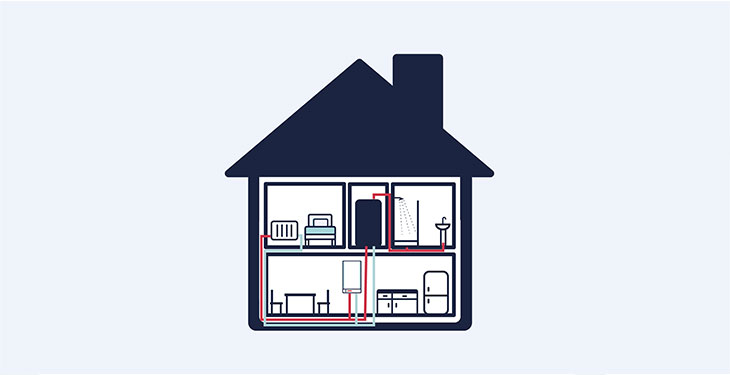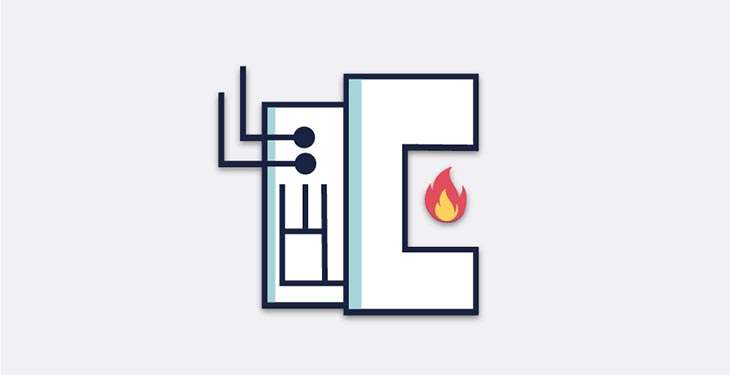

Written by Stephen Day
Gas Safe Engineer
Updated: 5th February, 2026
The type of boiler that you choose can have some major impacts on your heating and hot water systems, but it also depends on what kind of space you are trying to provide heating for.
Get a new boiler quote, save up to £550 per year (0% APR available).
There are many cases where one type of boiler will not work, but another one will, and the differences can sometimes be harder to spot than you might think.
Get a quote in 60 seconds, fitted as fast as next day!
0% APR finance available.
Get a free fixed price quote for a new boiler installed fast! - Find the perfect boiler!
If you need a new boiler for any reason, then it helps to understand what you can and can't do with your current heating system. Different limitations and features will alter what type of boiler fits your home (or workplace) best, especially in larger buildings with more rooms and multiple floors.
There are many ways to sort boilers into specific types and designs, but some differences have much more impact than others. Knowing about each boiler type can help when deciding which options would fit your needs best.
Heat-only boilers only produce heat, as the name suggests. This means they do not provide hot water but are much more effective at heating a room longer. While these lack the benefits of an extra water heating system, they are sometimes called a "regular boiler" since they are generally simpler than other types.
These boilers are sometimes called "conventional boiler" or "regular boiler" designs. If you are looking for a new conventional boiler, remember that it might not always be under the "conventional boiler" label.
A heat-only boiler is quite limited, but they can still be great boilers if that is all you need. A non-condensing option will be worse than a condensing one, but they can still heat water for your home's heating layout very well.
Many of these heating system boiler designs only need two tanks (a cold water cistern and a feed and expansion tank) and a hot water storage cylinder. This can make them easier to install than more complex designs but at the cost of any hot water production. They will usually have a tank in the loft since it is easier for the water to travel downwards.

Combination boilers (combi boilers) provide both heating and hot water but do not use a hot water storage tank. They are perfect for smaller homes and spaces without much room for a larger system but they also need a constant flow of water to operate properly since they have no storage tank.
Combi boilers are a great option for smaller spaces. The best combi boilers can provide the same benefits as a system boiler with far less space needed, and most combi boilers are also very efficient. A combi boiler will be weaker but also consume less power.
Remember that combination boilers significantly reduce the space you need. A combi boiler is very convenient, even if combi boilers are somewhat weak.
The 'combi' part of combi boiler designs means you get two different appliances in one frame, saving space and making repairs slightly more convenient. While they might lose some power, they are often good enough to work for most homes and are especially popular in flats or other one-floored spaces.

System boilers are part of your central heating system and the water storage system, taking water directly from the mains instead of a feed tank. They can be very versatile, able to heat several rooms and operate multiple bathrooms without dropping the temperature of your heating systems.
A system boiler can be a good option for regular boilers, acting like a larger combi boiler. If you want to stick to regular boilers and avoid complex features that you will not ever use, a system boiler can be a great choice.
The downside is their size - they need a large hot water storage tank. If this tank is drained due to high water usage over a long period, the system boiler can take a little while to refill it. This makes them a favourite of people with much larger homes or properties.

Back boilers are an outdated and no longer-used form of boiler system that mostly appears in older homes. They are inefficient, often close to breaking down and no longer supported by a manufacturer.
If you have a back boiler unit, it is best to replace it as soon as possible; you can read more in our back boiler replacement guide.
There are many ways that these types of boilers can be tweaked and improved, which means that explaining the basic types will not cover everything. Getting hot water on demand requires a lot of precise mechanical and electric parts, so each potential boiler for your home can have different features, functions and other differences.
The hot water cylinder of a boiler can come in two different types: direct and indirect. These generally vary based on the boiler types and how they are powered, but they can also have distinct designs that different manufacturers will create in different ways.
Both types can be vented or unvented, which changes how the water pressure is handled and where the excess heat goes. You can sometimes replace the hot water cylinder in a new boiler if the stock one is not effective or durable enough.
Direct cylinders store water and heat it from inside the tank using an immersion heater. These are straightforward, as the name suggests, making them a simpler boiler type to manage in the right situations.
Indirect hot water storage cylinder designs rely on a copper coil that passes through the cylinder, which is filled with hot water. This allows for indirect heating and keeps the hot water cylinder more versatile, letting it serve multiple functions simultaneously (like heating multiple bathrooms).
Condensing boilers are any boiler that uses a condensing system. This condensing boiler design recycles water vapour that would ordinarily be wasted by the hot water and heating system, turning it back into heat and/or water that can be reused for a more energy-efficient central heating system.
Condensing boilers are not based on any specific boiler type and can be made from nearly any boiler. Condensing boilers with combi boiler bases are one example, combining the recycling feature with the versatile design of a combi boiler.
A low hot water pressure means that the boiler can't easily move hot water upwards - in a ground-floor room, it will not be able to heat things above it well. This means that low-pressure boilers are best placed in higher-up areas, such as a loft or an airing cupboard on the building's highest floor.
Combi boilers are naturally low in water pressure most of the time so that you can treat combi boilers and low-pressure boilers similarly: place them up high and let the water flow downwards with gravity.
High-pressure boiler designs can move hot water around more easily, but this high water pressure can sometimes require a stronger water tank and pump to set up. Too much water pressure can damage certain sensitive components, and in some cases, excessive water pressure might even wear down bends in pipes to cause more frequent leaks.
Many boiler designs will turn off automatically if the water pressure climbs too high, and most of them will not see a spike in water pressure unless there is some technical issue. Most boiler models will be perfectly fine for almost 100% of the time you own them.
The hot water tank is vital to all boilers. System tweaks are often based around the hot water tank, where the system will store (and, in combi boilers, heat) the water you need. While size is already mentioned here, remember that a hot water tank has different heating elements.
For example, one hot water tank design might rely on a simpler but less effective way of adding heat to the water, slowing down the process. Another might be much faster but less efficient, which is great if you need hot water burst quickly without waiting.
The cold water tank stores the water before any heat is applied; not all designs use it. A combi boiler system will not always have one of these, but a regular boiler can often have an extra reservoir.
One has advantages and disadvantages, like having an extra supply of water but needing the space to install the tank, so it is mostly a case of what you think you will need most.
You need power to heat your home. When you heat the water in boilers, you use power, meaning energy efficiency is vital to any design. However, this also varies based on the type of power you are getting and the energy efficiency of the design that converts it into heating.
Gas boilers rely on processed natural gas from the mains system. These can be more efficient and cheaper than older alternatives like coal or oil, with around 90% efficiency in ideal circumstances. Gas boilers mostly get expensive if you overuse them.
All of these boilers need to be declared gas safe and have a proper connection to the mains. Ensure yours is registered in England under the Gas Safe Register since this proves it can be used without serious risk.
Gas boilers are great if your system can support the new boiler. You might have to adjust part of the system if you come from a non-gas boiler. Boiler designs need the right connections, so a gas boiler needs a constant flow.
This type of boiler benefits heavily from efficient designs. Good gas boilers can support larger heating systems and remain energy-efficient, especially condensing gas boilers.
An electric boiler uses electrical power to create heat. This boiler type often has fewer parts in the overall boiler system - boiler designs like this do not need to be as mechanical as conventional boilers that use gas heating. They are often also much smaller than regular boilers would be.
Electric heating boilers are perfect for a smaller space, trading some power for a much more efficient heating option. They cost much less to run than other boiler types and electric combi boilers are a staple of smaller spaces like individual flats.
Solar thermal designs use the natural sun heat, usually through solar panels. There are no specific designs to these systems: some are entirely solar-based, and others use solar heat to reduce energy bills by supplementing other power sources.
Most electric boilers are compatible with solar power but often need an intermediate (like a battery) to be physically compatible with solar panels since the boiler can't connect directly.
This type of boiler can be expensive to set up, but once they are in place, they can keep heating bills down. Unlike standard systems or conventional boilers, solar designs can be at least partially powered for free. With smaller boilers (combi boilers especially), the efficient designs mean that solar power is much more effective with them.
Once you understand the basics of each major boiler type and how you can keep your heating systems powered, you have to decide what kind of boiler is right for your particular situation. While there are always going to be certain boiler types explained better than others, most of them are suited for certain property types, sizes, or complexity levels.
There are also situations where your boiler needs extra appliances or components on top of the standard system. Boilers occasionally get extra water tanks, improved pipe layouts, or other additions if they need to tackle particular problems, making a normal water system much more complicated.
ou should first choose the kind of boiler you need. Heat-only, combi, and system boilers work very differently from one another, so even if they output the same amount of hot water, they would interact with your central heating differently.
For example, a combi boiler does not have a cold water storage tank and keeps only a tiny amount of cold water inside the boiler frame itself. This makes a combi boiler a bad choice for areas where the water supply can be interrupted often since you have no reservoir.
On the other hand, a combi boiler is perfect for a smaller house or a flat in a taller building since the combi boiler is energy efficient and can provide cheaper heating than regular boilers without needing a water tank.
Even if you are sure you do not need a water tank, though, there are a lot of combi boiler models. Some people may even add a water tank to their combi boiler to create a weaker system boiler since there can always be niches for this kind of adjustment.
The amount of radiators in your home significantly impacts the boilers you want to use. Many radiators mean lots of hot water, but it is not just about scale - most radiator systems are a continuous chain. This means the water can slowly lose heat as it passes through each radiator.
A poorly designed system can mean that the radiators at the end of this chain are filled with cold water. If a regular boiler is not supplying hot water that can cover each radiator, you may need to move away from these regular boilers and choose a new boiler that can retain this heat (or move the water faster).
In houses with only a few radiators, too much instant hot water can be too much for the system, especially at higher pressure. In these cases, a slightly weaker and cheaper boiler can be useful since it prevents wear and tear on the pipes if your radiators are damaged, you may consider replacing your radiators.
Do you need a boiler that can fit into an airing cupboard, or do you have enough space for any boiler type? A larger boiler does not always mean faster heat production; sometimes smaller boilers (combi boilers especially) can produce much hot water faster than a bigger design.
Size impacts the amount of room you need and how much water can be heated at once, so it can be important to consider this if your house might have higher hot water need at certain times.
Knowing what your new boiler has to handle can also be useful. Multiple bathrooms can take a lot out of weaker system boilers, and a weak combination boiler might struggle to get water up to a second floor. You need a hot water solution that can work with your home properly, regardless of what that means.
When you heat water, you use energy, and most energy comes from polluting sources. Regular boilers that rely on gas, coal, or oil burn fossil fuels and can sometimes release CO2 into the air, contributing to your carbon footprint.
Ideally, you should always go for an eco-friendly option. It does not matter if it is a combi boiler, system boiler, regular boiler, or condensing boiler: a boiler that pollutes less leads to a cleaner environment and higher overall heat efficiency.
The flow rate calculates how fast water flows through your system and leaves your taps, shower heads, and other appliances. Like pressure, this helps you decide if boilers work to the standard you need: if you are trying to get water up multiple floors, a good flow rate is generally helpful as long as you do not go for something too high.
Having a gas-safe boiler authorised and regulated by the proper authorities is important, not just for legal reasons. If you are trying to cut heating bills by making unsafe modifications to boilers, it can be incredibly dangerous, so it is important to know that your new boiler is going to run without exploding or spraying scalding-hot water onto you.
For many boilers, having an open vent nearby is vital to keeping the air cool and letting extra water vapour out.
New boilers can be a daunting purchase for many people as they’re an appliance with a lot of responsibility, providing heat for you and your family is something you want to get right. Boilers aren’t exactly a quickly disposable item either, potentially lasting you a decade.
Effectively, new boiler cost can be split into two segments: the first is the actual boiler itself (unit price), and the second is the cost of the boiler being installed (set up) in your property by an expert engineer.
Here at iHeat, we remove all of this undue stress and make the decision making process of upgrading to a new heating system, as easy as possible.
Get a quote in 60 seconds, fitted as fast as next day!
0% APR finance available.
Last updated: 5th February, 2026

Written by Stephen Day
Gas Safe Engineer at iHeat
Stephen Day is a Gas Safe registered and FGAS certified engineer with over 20 years of hands-on experience in the heating, cooling, and renewable energy industry, specialising in boiler installations, air conditioning, and heat pump systems.
LinkedInArticles by Stephen Day are reviewed by iHeat’s technical team to ensure accuracy and reliability.

19th February, 2026
Selecting the appropriate boiler for your London home involves understanding the different...
 Read Article
Read Article

19th February, 2026
A typical Annual Boiler Service includes a visual inspection to identify any obvious fault...
 Read Article
Read Article

19th February, 2026
Boiler servicing comprises a set of inspections and tests conducted by a qualified enginee...
 Read Article
Read Article
No obligation. Takes less than 60 seconds.